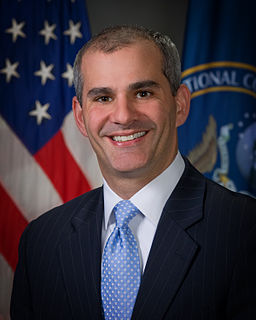A Quote by Frank Abagnale
I kept a notebook, a surreptitious journal in which I jotted down phrases, technical data, miscellaneous information, names, dates, places, telephone numbers, thoughts, and a collection of other data I thought was necessary or might prove helpful.
Related Quotes
There is so much information that our ability to focus on any piece of it is interrupted by other information, so that we bathe in information but hardly absorb or analyse it. Data are interrupted by other data before we've thought about the first round, and contemplating three streams of data at once may be a way to think about none of them.
There were many words that you could not stand to hear and finally only the names of places had dignity. Certain numbers were the same way and certain dates and these with the names of the places were all you could say and have them mean anything. Abstract words such as glory, honor, courage, or hallow were obscene beside the concrete names of villages, the numbers of roads, the names of rivers, the numbers of regiments and the dates.
The USA Freedom Act does not propose that we abandon any and all efforts to analyze telephone data, what we're talking about here is a program that currently contemplates the collection of all data just as a routine matter and the aggregation of all that data in one database. That causes concerns for a lot of people... There's a lot of potential for abuse.
Data isn't information. ... Information, unlike data, is useful. While there's a gulf between data and information, there's a wide ocean between information and knowledge. What turns the gears in our brains isn't information, but ideas, inventions, and inspiration. Knowledge-not information-implies understanding. And beyond knowledge lies what we should be seeking: wisdom.
Scientific data are not taken for museum purposes; they are taken as a basis for doing something. If nothing is to be done with the data, then there is no use in collecting any. The ultimate purpose of taking data is to provide a basis for action or a recommendation for action. The step intermediate between the collection of data and the action is prediction.
I regret that my coauthors and I omitted statistically significant information in our 2004 article published in the journal Pediatrics. The omitted data suggested that African American males who received the MMR vaccine before age 36 months were at increased risk for autism. Decisions were made regarding which findings to report after the data were collected, and I believe that the final study protocol was not followed.
My study is NOT as a climatologist, but from a completely different perspective in
which I am an expert … For decades, as a professional experimental test engineer, I have analyzed experimental data and watched others massage and present data. I became a cynic; My conclusion - 'if someone is aggressively selling a technical product who's merits are dependent on complex experimental data, he is likely lying'. That is true whether the product is an airplane or a Carbon Credit.
... negative feelings are not true feelings at all; rather, they are your thoughts about something, based always on the previous experience of yourself and others. You will not find Truth in your past data, only past data that is based on other past data that is based on other past data, and so forth. Forget your "past experience" and look directly at the experience you are having. Right Here, Right Now. There is your Truth.


































